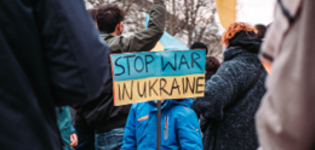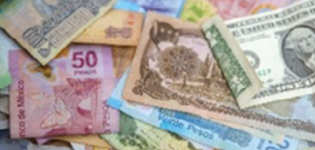Blog
Zelenskiy’s wartime transformation
From comedian to national hero
Shock over the Russian invasion of Ukraine on 24 February 2022 continues to be felt. The heroic behaviour of Ukrainian President Volodymyr Zelenskiy, from the first days of the invasion, has been equally surprising and inspiring for everyone observing the developments in Ukraine.
Zelenskiy, a former comedian, is the unlikely hero of the first weeks of the war. Before, he was widely considered to be an inefficient and inexperienced politician, unable to guide Ukraine to development, stability, and prosperity. In January 2022, only 31% of Ukrainians looked positively at his presidency.
This apparently reassured Russia’s President Vladimir Putin that Zelenskiy’s overthrow would find large public approval in Ukraine. For many analysts, the notion that Zelenskiy was a weak leader was likely a factor in Russian confidence that it could easily conquer Ukraine.
From unpopular president to national hero
Yet, Zelenskiy has proved most of the world wrong. Instead of setting up a safe government from a distance, Zelenskiy launched a campaign of Twitter video messages that showed him walking around the Ukrainian capital, Kyiv, and heartening up Ukrainian defenders as Russian armed forces advanced toward the city. Zelenskiy issued a video address to the people of Russia, highlighting friendship between the two nations. He pleaded to ordinary Russians to help him stop the war in the name of their nations’ brotherhood.
In his next move, Zelenskiy targeted European elites with a series of moving video messages and calls appealing for immediate help. At the end of one call, Zelenskiy saluted European leaders, saying that this could have been the last time they saw him alive — referring to intelligence information that a group of mercenaries associated with the Russian state sought to assassinate him and his family.
Galvanizing support from the West
In a very short period, Zelenskiy secured unprecedented and largely unexpected help from many countries around the world, particularly from those in the European Union. This assistance included humanitarian and, surprisingly, military assistance. Ukraine’s official request to be immediately admitted to the EU was given serious deliberation by the EU Parliament, though the country has no hope of being admitted so quickly under the conventional requirements that would hold in normal circumstances.
In response to Zelenskiy’s pleas, Western countries imposed far-reaching sanctions on Russia. To name one unexpected example, even historically neutral Switzerland froze Russian assets in Swiss banks. Russian citizens have been practically cut out of Europe and a few other parts of the world financially, physically, and even socially — being subjected to various bans related to mainstream global entertainment and sport events.
What explains the extraordinary and against-all-odds success of Zelenskiy to marshal support in the early days of the war? One plausible explanation is that the same set of skills that made him a laughing stock in the past — comedian’s craft — are now helping him win the war for people’s emotions. Zelenskiy has moved millions of people, including Western elites.
He mobilized the global public to cheer for Ukraine, fear for his life, and follow daily updates on the conflict. No doubt, there would have been public sympathy for Ukraine anyway. Yet, Zelenskiy arguably gave these sentiments a significant boost and accelerated the movement from sympathy to action in the related international support processes. Without his skilful appeals, much of the help offered may have arrived too late or not at all.
The (critical) role of political leaders during violent conflict
Zelenskiy’s actions in the current conflict reopens a long-time debate in political science about the influence of leaders on societies in conflict (for example). Some scholars argue that leaders simply reflect the grass-root sentiments of their constituencies. Others, however, claim that leaders shape people’s preferences and actions during conflict. Zelenskiy is another case in point for the latter stance.
Steadfast dedication to peace, apparent in all Zelenskiy’s messages, is what arguably makes him particularly influential. In my recent study of politicians’ responses to political assassination, I found that conciliatory political leaders receive greatest engagement during escalating crises. Surprisingly, confrontational and inflammatory leaders are often shunned by the public when tensions are high.
Events in Ukraine raise important questions about the role of political leadership not only during war, but also after the cessation of hostilities. How important are leaders for post-conflict recovery and reconciliation? I work toward answering this question in a new project that focuses on the legacies of violent conflict. I focus on the institutional legacies of the Second World War in Poland.
One of the tragedies of the Second World War in Eastern Europe was a systematic extermination of elites during and after the war at the hands of Soviet forces. Sadly, this strategy finds continuity in contemporary Russian plans to eliminate Ukrainian elites after the expected capture of Kyiv, as intelligence sources reveal. The Russian goal may be the long-term destabilization of Ukraine.
After witnessing the importance of Zelenskiy’s actions for Ukraine in the last few days, it becomes all the clearer that the strong public presence of peaceful political leaders can play a fundamental role in shaping the trajectory and outcome of a conflict. The words and actions of good leaders are fundamental for stability in Eastern Europe on the difficult road ahead.
Krzysztof Krakowski is an Assistant Professor of Political Science, Collegio Carlo Alberto, Turin and a collaborating researcher in the UNU-WIDER project Institutional legacies of violent conflict.
The views expressed in this piece are those of the author(s), and do not necessarily reflect the views of the Institute or the United Nations University, nor the programme/project donors.
 Join the network
Join the network












